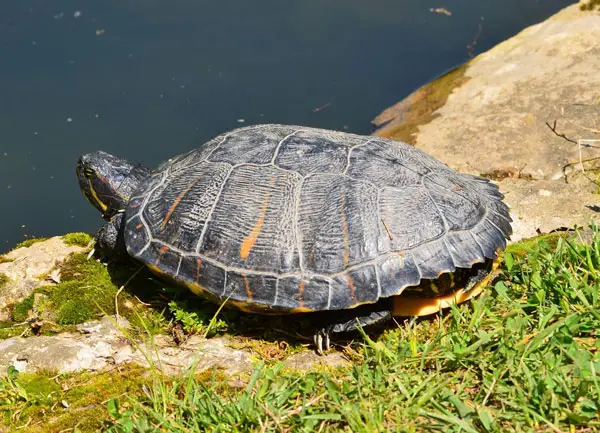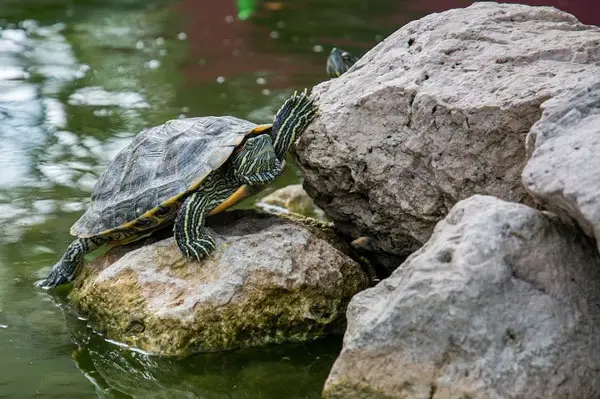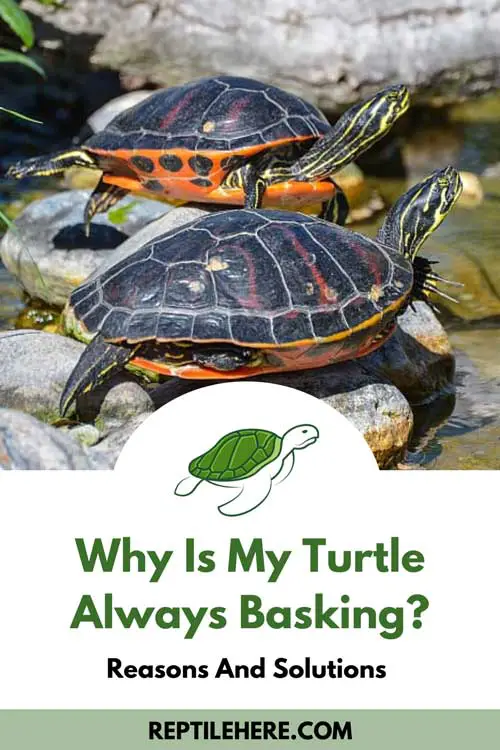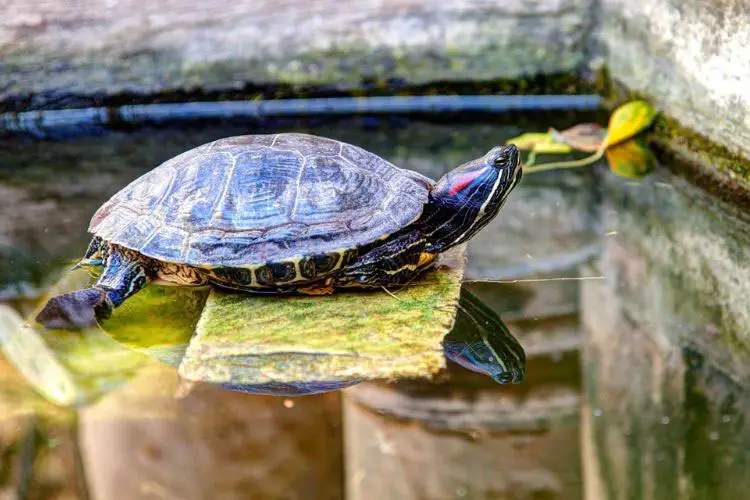Why Is My Turtle Always Basking? Reasons And Solutions
If you have a pet turtle, you may have noticed that it enjoys basking. Even after you put it back in the water, it still wants to go where the sun is. Basking benefits your turtle, but excessive basking is unhealthy and may indicate an underlying issue you need to address.
Why is my turtle constantly basking? If your turtle is always basking, it could be because the water is too chilly. The turtle could also be suffering from a respiratory ailment or be pregnant.
Turtles have cold blood and must bask to regulate their body temperatures. They bask for two to three hours per day, or even up to nine hours. This article will go over why your turtle is always basking and how to fix it, among other things.
Why Is My Turtle Always Basking?
Contents
The following are reasons why your turtle is always basking.

Respiratory infections
Turtles are very susceptible to respiratory infections, especially during winter. Although some turtles hibernate during winter, captive turtles do not. Why? Because they are used to a specific routine.

Most turtle owners do not know that a turtle tank will become extremely cold when temperatures drop. The most common signs of a sick turtle are;
- Nasal discharge or pus-like discharge from its mouth
- Red and swollen eyelids
- Wheezing sounds when breathing
- The turtle may seem lethargic. A lethargic turtle will be sluggish and display a lack of appetite.
- Basking a lot
- Avoiding swimming or lopsided swimming
If you notice any of the above signs, it is best to take the turtle to a veterinarian for treatment.
Pregnant turtle
Turtles do not become pregnant; we refer to it as being gravid. A gravid turtle prefers to stay under the heat lamp for longer. If unsure if your turtle is gravid, pick it up and examine the area under its back legs. If you feel something hard, then your turtle is pregnant.
Water temperature
If your turtle is healthy, the problem could be the water temperature. The ideal turtle temperature is 70 degrees Fahrenheit for adults and 80 degrees Fahrenheit for babies. You can use a thermometer to check the temperature of the tank’s water.

If the water temperature falls below 70 degrees, you can use a water heater, especially if you live in a cold climate. In addition, if the water is too hot, the turtle will avoid it. As a result, it is critical to invest in a digital thermometer to keep track of the temperature of the water.
Note that there should be a 10 degrees difference between the basking area and the water’s temperature.
Water quality
If your turtle, especially a red-eared slider, refuses to stay in the water, something is wrong. Red-eared sliders spend most of their lives in water, so if yours avoids the water, it may be due to the water’s pH levels.
The tank’s water should meet the following requirements;
- A pH level should range from 6-9
- 0.4 ppm nitrite concentration
- 30-35 ppm nitrate concentration
- Chlorine and Ammonia levels should be zero
If the water’s quality does not meet these requirements, the turtle might feel irritated and try escaping from the tank. You can use a pH monitor to check the water’s pH. Also, if the water is dirty, ensure you change it.
Bullying
Turtles are solitary creatures, so they are very territorial. If you have more than one turtle in the water tank, especially male turtles, you will most likely find one of them constantly on the basking platform. The turtle might be trying to escape attacks from the others.
Other ailments
If the turtle is not suffering from respiratory diseases, it might suffer from other conditions such as septicemia. Septicemia is when a turtle has blood poisoning. It results from a turtle ingesting heavy metals or when it eats something poisonous, which starts toxifying its blood.
Here are the symptoms of septicemia.
- The turtle will always be under UV light.
- It will constantly be in its shell, mainly at the bottom of the tank
- Reddened skin and shell
- Vomiting
- Swollen eyes
Take the turtle to the veterinarian immediately if you notice these signs.
Parasites
If it is not sickness, your turtle might be infested by parasites. Unclean food or raw meat might contain parasites. So if you recently fed your turtle with either, you need to take the turtle to a veterinarian who will do a fecal examination.
How Long Can Turtles Bask In The Sun?
Turtles usually bask for about 2-3 hours, but at other times, they can bask for up to 10 hours. According to research, the basking time relies on the turtle’s body temperature and species.
Aquatic turtles bask for at least 6 hours and painted turtles for at most three hours. Basking is essential for a turtle, so if there is no sun, you can put the tank under a UV light bulb during the day and shut it off during the night.
There are two types of UV lights. The UV-A light is essential during the turtle’s mating season and regulates the turtle’s mood. The UV-B light helps the turtle produce vitamin D3, which helps with calcium intake, strengthening the turtle’s bones.

You can find a UV light with both A and B lights. Another question that regularly bothers turtle owners is how long you should keep the basking light on. The optimum thing to do is mimic the sun’s cycle and switch it on during and off at night.
In winter, you can keep the basking light on for longer during the night. Check your basking temperature regularly to ensure it is not too hot. Anything above 105 degrees will be too hot for the turtle.
Also read: How To Trim A Turtle’s Nail?
What To Do If Your Turtle Is Always Basking?
Here are some ways you can prevent your turtle from basking too much.

- If you have more than two turtles, especially of the same sex, ensure your tank is large enough. A large tank will have enough room for all the turtles to explore.
- If it is anything to do with an infection, take your turtle to a veterinarian immediately.
- Always check your water temperature, so it is not too hot or too cold for your turtles. Maintain 80-85 degrees Fahrenheit for sliders, painted turtles, map turtles, cooters, and box turtles.
- You should set the basking lamp at 80-90 degrees Fahrenheit.
- Ensure you put clean water in the tank to eliminate the chances of ammonia and other toxins.
- Check the water’s pH level to ensure that it ranges from 6-9 to be optimum for your turtle.
- Do not feed your turtle unclean fruits, vegetables, raw meat, or insects. This is to eliminate the chance of ingesting parasites.
Why Is Basking Important?
Basking is vital for turtles because:

- It helps the turtles produce vitamin D, which aids in calcium intake. Lack of vitamin D can cause serious health issues such as poor bone development.
- Turtles, such as map turtles and sliders, need to dry their shells to prevent moss from forming in or on them. Basking also eliminates fungal infections and leeches.
- Basking also regulates the turtle’s metabolism making it swim better, among other activities.
- Basking is essential for turtles during the breeding season.
- It also helps with regulating the turtle’s mood. A turtle who has had enough heat is a happy turtle.
Related Questions
Here are other related questions.
No, it is not normal. Turtles usually bask too much if they are sick, gravid, or the water is not conducive. Illnesses such as respiratory infections and parasite infestations can cause a turtle to bask. Ensure you identify the issue and take the steps necessary to address it.
One of the reasons why your turtle is not basking is because you changed its basking platform. The turtle may be hesitant to explore the new environment.
Another reason could be that the turtle is overheating in the basking area. The ideal temperature should be between 80 and 90 degrees Fahrenheit.
Your turtle may be basking too much if;
1. You observe your turtle getting out immediately when you put it in water.
2. Your aquatic turtle spends significantly less time in the water.
3. Your box turtle is always under the basking light.
Related: Can You Drown a Turtle?
Conclusion
So, why is my turtle always basking? It could be due to sickness, pregnancy, or the water quality in the tank. Basking is crucial for a turtle because it helps with its mood and overall body health.
It also prevents moss and fungal infection. Try and check the water’s quality and ensure that the pH is optimum and the water is clean. We hope you now know how to handle a turtle that basks too much.



